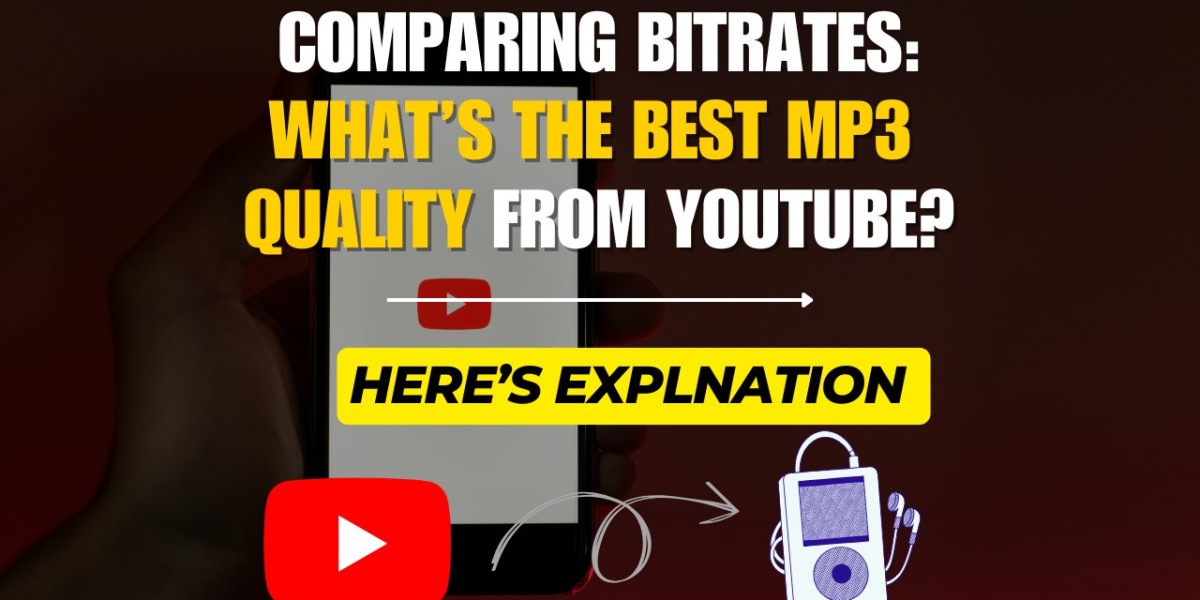Why Audio Quality Matters
We all love our favorite songs, podcasts, or educational content from YouTube. But when converting them to MP3, audio quality makes a big difference. Crisp vocals, clear instrumentals, and smooth playback- none of that happens without a decent bitrate.
What We Mean by Bitrate in MP3 Files
Bitrate refers to how much audio data is processed per second. In simple terms, it's like the resolution of a photo; higher means better quality, but also bigger file size.
Understanding Bitrates
What Is Bitrate in Audio?
Bitrate is measured in kilobits per second (kbps). A higher kbps value generally means more audio information is retained per second, resulting in better sound.
The Role Bitrate Plays in File Size and Quality
More bitrate = more detail = larger file. For example:
128 kbps: Small size, OK for casual listening
320 kbps: Large size, audiophile-friendly
Types of Bitrates: CBR vs. VBR
CBR (Constant Bitrate): Fixed quality throughout
VBR (Variable Bitrate): Adapts bitrate depending on the complexity of the audio
Common MP3 Bitrate Options
128 kbps – The Most Basic Level
Good enough for speech and background listening. It’s the default in many converters, but not ideal for music lovers.
192 kbps – The Balanced Middle Ground
A better compromise between size and sound. Music sounds decent without hogging too much storage.
256 kbps – High Quality with Moderate File Size
Almost indistinguishable from CD quality for most users. It's a sweet spot for podcasts and music alike.
320 kbps – Maximum MP3 Quality
This is as good as MP3 gets. Great for music libraries and audiophiles, if your source quality is also high.
YouTube’s Original Audio Quality
Does YouTube Offer Lossless or Compressed Audio?
YouTube uses compressed audio. So even if you download at 320 kbps, you're just upscaling, you won’t magically regain lost quality.
What Is the Highest Audio Quality Available on YouTube?
YouTube streams audio at around 128 kbps AAC for standard videos, and up to 256 kbps in some HD videos or YouTube Music.
Audio Codecs Used by YouTube
YouTube commonly uses AAC or Opus audio codecs. These are efficient, but still compressed formats, not raw or lossless.
MP3 Conversions from YouTube
How YouTube to MP3 Converters Work
They extract the audio stream from the video and encode it into MP3 format. Some tools let you pick the bitrate manually.
Bitrate Selection in Conversion Tools
Many converters (like FLVTO, YTMP3) offer presets like 128 kbps, 192 kbps, and 320 kbps. Choose wisely, higher isn’t always better if the source is low quality.
Can You Get 320 kbps from YouTube?
Technically, yes. Realistically, no. You can export to 320 kbps, but the original file from YouTube rarely exceeds 256 kbps AAC equivalent. You're not gaining quality, just file size.
Best Practices for Downloading High-Quality MP3s
Choosing the Right Bitrate for Your Needs
For podcasts/speech: 128 kbps is fine
For general: 192–256 kbps is ideal
For high-end listening: 320 kbps (only if the source is excellent)
Recommended YouTube to MP3 Converters
Free Tools with Quality Settings
Flvto Click – Simple, fast, includes 320 kbps option
YTMP3.cc – Reliable and ad-free
MP3FY – Supports long videos and bulk downloads
Paid Tools Offering Advanced Quality Control
4K YouTube to MP3 – Offers best-in-class control over output
YT Saver Pro – Enables multi-platform downloads with high bitrate
Audio Quality vs. File Size Trade-off
When to Choose Lower Bitrates
If you're using mobile data or have limited storage, 128 or 192 kbps does the job without draining space.
When to Go for 320 kbps
If you’re using high-quality headphones or speakers and have storage to spare, this level ensures every nuance is preserved.
Real-World Listening Differences
Can Humans Hear the Difference?
Most people can’t distinguish between 256 and 320 kbps in blind tests. But differences become noticeable with very detailed music and high-end equipment.
Devices and Headphones Influence Perception
Your cheap earbuds might not reveal the richness of 320 kbps. But studio monitors or noise-canceling headphones absolutely will.
Conclusion
When it comes to MP3 quality from YouTube, more bitrate isn’t always better. While 320 kbps is the theoretical best, your actual results depend on YouTube’s original stream quality. If the video only streams at 128 kbps, converting it to 320 kbps won’t upgrade the sound. The key is balance, pick the bitrate that suits your ear, storage space, and use case.






